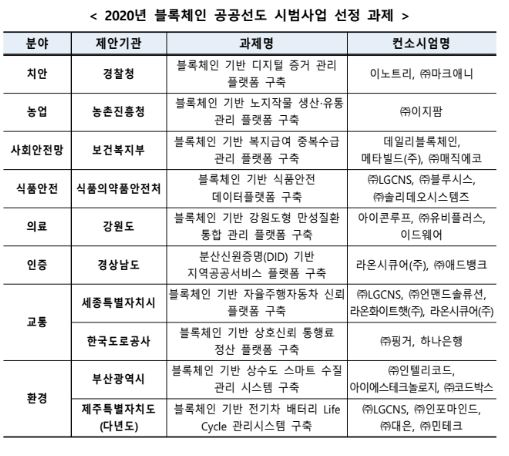South Korea government and private companies continue to work together to develop blockchain projects in 2020. The Ministry of Science and ICT and KISA announced the new candidates of ‘public pilot blockchain project’ and ‘private citizen project’ on the 7th, during 2020 Blockchain Project Launch Demonstration conference.
The public pilot projects are selected based on over 400 demands from public institutions and organizations. This year, we have ▲blockchain-based digital evidence management platform (national police agency), ▲blockchain-based platform for welfare benefits (Ministry of Health and Welfare), ▲blockchain-based GangWon-Do chronic disease management platform (GangWon), ▲water-quality management system (Busan), ▲mutual-trust toll payment platform (Korea Expressway Corp), ▲crop-production distribution and supply platform (Rural Development), ▲food safety database platform (Ministry of Food and Drug Safety), ▲identification-verification digital public services platform (Kyungsangnam-do), ▲self-driving vehicle trust platform (Sejong), ▲electric-vehicle battery life cycle system (Jeju), and more – except for the last Jeju project, the rest are completely new. Jeju project was selected last year and it will continue to expand for next few years.
The consortium companies to develop these projects have been selected as well. Innotree and Markany will work on the project requested by Police Agency, whereas Iconroof, Ubiplus, and Ediware are participating on GangWon-Do project. RaonSecure and Edbank will work on KyungSangNamDo’s DID project.
LG CNS is expected to participate in three projects, including the Ministry of Food and Drug Safety, Sejong City, and Jeju Province, and is the most actively participating company among the selected companies.
More than 20 consortium (over 60 companies) applied for the private ‘citizen project,’ however, only 3 (12 companies) were selected at the end for the following projects: ▲blockchain-based smart digital freight platform (Naver, LG CNS, Korea Transportation Society, Cargo Welfare Foundation), ▲blockchain-based, non-face-to-face video and voice contract support system for small business owners and individual contractors (Douszone, Markany, Korea Productivity Center Administration), ▲blockchain-based medical electronic document management mobile platform (Mediblock, Samsung Seoul Hospital, Seoul National University Hospital, Severance Hospital, Yonsei University).
At the project launch conference, the participating companies and private entities shared their 2020’s project progress as well as future plans. RaonSecure introduced a business plan for the blockchain-based platform for citizen identification-verification using the distributed proof of identities (Kyungsangnam-Do project). Mediblock, which participated in the private sector project, proposed an approach that enables the patients to submit medical information and documents to service providers electronically through a personal, mobile electronic documents management system.
In the free-discussion session that followed after the presentation, the representatives of the industry urged the government to “make continuous efforts to ensure the projects does not end in a single year, but can be improved and progressed through a follow-up projects, and to be incorporated into the government’s digital innovation projects” as well.
The Information and Communication Policy Officer of Ministry of Science and ICT, Mr. YoonGyu Park, said that “the recent COVID-19 related policies have accelerated the digital era of non-face-to-face technologies” and that the “government will try its best to improve the daily lives of the citizens by leading the application of blockchain technology, which is attracting more attention as an essential infrastructure of this era, both to the public and private sectors.”




